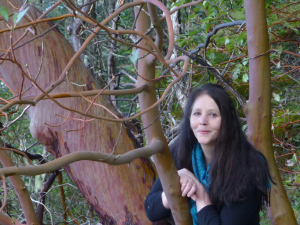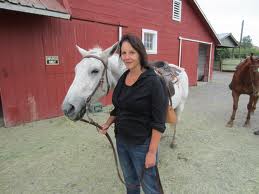#28 John Pass & Theresa Kishkan
December 02nd, 2015

LOCATION: Intersection of May and Memorial, adjacent the Ross Bay cemetery, Victoria
Before they took up long-term residency as parents on the Sunshine Coast, the married co-publishers and writers John Pass and Theresa Kishkan fell in love in Victoria in 1979 and were married in nearby Sidney that year in October. More than thirty years later, Pass republished poems from that era in a retrospective collection, Forecast (2015).
May and Memorial
I’ve just thought, comfortably
of making love to you
some warm spring evening
among the graves.
At the corner
of May and Memorial
there is a house we could live in
with low bright windows reflecting
the cemetery, mooning
those sun-long avenues.
May and Memorial in Victoria is also the setting for part of Theresa Kishkan’s novel, The Age of Water Lilies. The main character, Flora Oakden, relocates from Walhachin to a house on the corner of May and Memorial and lives the rest of her life there. Across the street is the Ross Bay Cemetery where another character, Tessa, dreams her way through childhood, trying to locate the buried creeks, trying to figure out something about war and commemoration. “It was where I spent a few years of my childhood,” says Kishkan, “and a place I also wander into and out of in my memoir, Mnemonic: A Book of Trees.”
ENTRY:
John Pass was born in 1947 in Sheffield, England and has lived in Canada (in Calgary, Winnipeg, Coquitlam, Vancouver and on the Sunshine Coast) since 1953. He has a BA in English from the University of British Columbia (1969) and taught at Capilano College (now Capilano University) in Sechelt and North Vancouver from 1975 to 2007.
By 2015, Pass had published nineteen volumes (books and chapbooks) of his work and his poems had appeared in numerous magazines and anthologies in Canada, the US, the UK, Ireland and the Czech Republic. In 1988 he won the Canada Poetry Prize, an international competition sponsored by Canada/India Village Aid. His poetry has won awards from The League of Canadian Poets, The BC Federation of Writers and BC Cultural Services, and has been nominated for National Magazine Awards and The Pushcart Prize. He was Visiting Poet at Brigham Young University in Utah in l990 and a mentor in 1997 at Otherwords, the Writing & Publication Workshops of the BC Festival of the Arts.
In 2001 Pass won the Gillian Lowndes Award for significant achievement by a Sunshine Coast Artist. He has served as editor/mentor to poets at The Banff Centre for The Arts, as Guest Writer at The Sage Hills Writing Experience, and on juries for The Malahat Review Long Poem Prize, The Butler Prize, The Dorothy Livesay Award and The Governor General’s Literary Award for Poetry. He has read at literary festivals across Canada, including the Ottawa International Writers Festival, The Sunshine Coast Festival of The Written Arts and the Whitehorse Poetry Festival. He has also read abroad at venues in the US, England and, most recently, at universities and festivals in the Czech Republic. He was the recipient in 2002 and 2009 of senior arts awards from the Canada Council.
Central to Pass’s oeuvre are a linked quartet of books pulling the personal into focus through our culture’s largest lenses: classical, Christian, Romantic, and modern/post-modern. The first and third volumes in this series, The Hour’s Acropolis (Harbour Publishing, 1991) and Water Stair (Oolichan Books, 2000) were shortlisted for The Dorothy Livesay Poetry Prize (BC Book Prizes). Water Stair was shortlisted for the Governor General’s Literary Award in Poetry. Stumbling in The Bloom (Oolichan Books, 2005) won the Governor General’s Award in 2006. His first book of poetry after winning the Governor General’s Literary Award, crawlspace (Harbour, 2011), explored the ‘strictures and limitations’ of aging, love and loss, and family ties. It won the 2012 Dorothy Livesay Poetry Prize.
John Pass gathered a selection of early, out-of-print poems for Forecast: Selected Early Poems 1970–1990 (Harbour 2015). In the foreword he states, “I came of age in a society devolving into conformity and anxiety, but British Columbia’s southwest coast felt simultaneously timeless, gorgeous, spacious–a lagoon of potentiality welled within wild borders of vast geography, unopened history–and my path was lit with the time’s late flare of Romantic idealism and Modernist authority.”
With his wife, writer Theresa Kishkan, John Pass lives on 8.5 acres of forest, garden and orchard near Sakinaw Lake on B.C.’s Sunshine Coast, where they built a house, raised three children, and run High Ground Press, specializing in the letterpress printing and publication of poetry broadsheets.
AWARDS & GRANTS
Finalist, Malahat Review Long Poem Prize, 2015
Dorothy Livesay Poetry Prize, BC Book Prizes, 2012
Nominee, National Magazine Award, 2011
Nominee, Pushcart Prize, 2011
Canada Council Senior Arts Award, 2009
Governor General’s Literary Award for Poetry, 2006
Canada Council Senior Arts Award, 2002
Gillian Lowndes Award, 2001
Finalist, Dorothy Livesay Poetry Prize, BC Book Prizes, 2001
Finalist, Governor General’s Literary Award for Poetry, 2000
Nominee, National Magazine Award, 1996
B.C. Cultural Services Award, 1996
League of Canadian Poets National Poetry Contest (2nd), 1994
Finalist, Dorothy Livesay Poetry Prize, BC Book Prizes, 1992
Canada Poetry Prize (1st), Canada/India Village Aid International Poetry Contest, 1988
Honourable Mention, BC Federation of Writers Literary Rites Competition, 1987
Canada Council Short-term Grant, 1974
RESIDENCIES
Visiting Poet at Brigham Young University, Winter Term 1990, teaching undergraduate and graduate courses in Creative Writing and The Writing of Poetry.
Mentor in Writing & Publication workshops for Otherwords, The BC Festival of The Arts Writing Program, Powell River, May 1997
Editor/Mentor in the Writing Studio at The Banff Centre, May 2002
Guest Writer, The Sage Hill Writing Experience, Regina SK, May 2008
TEACHING EXPERIENCE
Pass was an English Instructor in the Adult Basic Education Program at Capilano College (now Capilano University) 1975 – 2007, teaching composition and writing skills from literacy to college foundation (English 100 entry) levels. In the early 1980’s he developed a sequence of ABE English courses at Capilano that was adopted province-wide in BC colleges. He has been Co-ordinator of the ABE Program at Lynmour and Sechelt campuses.
Previous to his work at Capilano College he taught English and Drama in a number of secondary schools in Vancouver, North Vancouver and Coquitlam. He has given poetry readings and directed classes in writing-related activities to students at every level from pre-school through graduate school.
He co-taught, with Theresa Kishkan, West Coast Writing, a BC Literature course at Masaryk University, Brno, Czech Republic, February 2012
BOOKS & CHAPBOOKS
Forecast (Selected Early Poems 1970 – 1990) Harbour Publishing, Madeira Park, 2015, $18.95 978-1-55017-731-2
crawlspace, Harbour Publishing, Madeira Park, 2011 (96 pp) ISBN 978-1-55017-519-6
Self Storage, Leaf Press, Lantzville, 2011, (21 pp) ISBN 978-1-926655-26-0
Stumbling In The Bloom, Oolichan Books, Lantzville, 2005 (120 pp) ISBN 0-88982-201-8
Twinned Towers, Fox Run Press, Madeira Park, 2005 (24 pp) ISBN 0-9732305-8-4
nowrite.doc, Leaf Press, Lantzville, 2004 (29 pp) ISBN 0-9732765-7-6
Water Stair, Oolichan Books, Lantzville, 2000 (103 pp) ISBN 0-88982-179-8
Mud Bottom, High Ground Press, Madeira Park, 1996 (17 pp)
Radical Innocence, Harbour Publishing, Madeira Park,1994 (72 pp)
ISBN 1-55017-107-0
The Hour’s Acropolis, Harbour Publishing, Madeira Park, 1991 (82 pp)
ISBN 1-55017-043-0
Rugosa, Reference West/Hawthorne Society, Victoria, 1991 (24 pp)
ISBN 1-895362-22-11
An Arbitrary Dictionary, Coach House Press, Toronto, 1984 (74 pp)
ISBN 0-88910-284-8
There Go The Cars, Sesame Press, Windsor, 1978 (24 pp) ISBN 0-920580-02-5
Blossom: An Accompaniment, Cobblestone Press, Vancouver, 1978 (32 pp)
Love’s Confidence, Caledonia Writing Series, Prince George, 1976 (32 pp)
Port Of Entry, Repository Press, Prince George, 1975 (48 pp)
AIR 18, Airbooks, Vancouver, 1973 (34 pp) ISSN 0044-6947
The Kenojuak Prints, Caledonia Writing Series, Prince George, 1973 (16 pp)
Taking Place, Talonbooks, Vancouver, 1971 (40 pp)
—
ENTRY
Born in Victoria, B.C. on January 6, 1955, Theresa Kishkan has have lived on both coasts of Canada as well as in Greece, Ireland, and England. She was educated at the Universities of Victoria (B.A., with Honours, 1978) and British Columbia (MFA, not completed). In August, 1985, she was part of a collaborative effort staged at the Vancouver Museum which featured Judy Chicago’s Birth Project and the writing of women poets and novelists concerned with the issue of childbirth. A cycle of Kishkan’s poems from Ikons of the Hunt was set to music by Canadian composer Steve Tittle. The composition, “Charms & Spells”, was sung by Rosemarie Landry and received its world premiere at the Scotia Festival in 1987. It was recorded by CBC Stereo for broadcast on Arts National. Kishkan has taught writing classes, ranging from workshops for young children to writing courses for adults at the college level. She has given many public readings and participated in literary festivals. Her interests include natural and regional history, textiles, classical literature and gardening.
Based on a year she spent on a bleak island off the west coast of Ireland in the 1970s, Theresa Kishkan’s Inishbream explores the relationships between land and sea, islanders and mainlanders. With engravings by John DePol and bound by Helene Francoeur, Inishbream has been available from Barbarian Press in Mission in quarter cloth with patterned over boards at a mere $250 a pop. In her fictional follow-up A Man in a Distant Field (Dundurn $21.99), Declan O’Malley comes to the coast of B.C. to escape memories of his family’s death at the hands of the Black and Tans in Ireland. While working on a perfect translation of Homer’s Odyssey, he’s drawn back into his own Irish troubles.
Wistful reminiscences of Kishkan’s romantic times in Ireland during her 20s, as well as a memoir of returning there 23 years later with her son, in 2001, are the highlights in Phantom Limb (Thistledown $15.95), a collection of self-reflective essays and poetic narratives. It also includes a lovely piece about searching for Granite Creek, an interior community founded in 1885. “At what point is a place simply erased from a map in its literal sense? All over British Columbia there are significant town sites which hold only ghosts of their former selves.”
Kishkan was a co-recipient of the bp Nichol Chapbook Award in 1992 for Morning Glory, published by Victoria’s Reference West. She makes her home on the Sechelt Peninsula with her husband and fellow author John Pass and their three children. She and John Pass were once guests on the cooking show, Galley Chefs, produced for the Knowledge Network. The segment was filmed in their home near Pender Harbour which they designed and built themselves. It includes a print shop with an antique letterpress.
In 2009, from a list of nine nominated titles from the past two years, Teresa Kishkan won the inaugural Readers’ Choice Award presented by the Creative Nonfiction Collective at the Banff Centre for her writing from Phantom Limb (Thistledown).
Her third novel, The Age of the Water Lilies, combines life in the B.C. Interior in the early 1920s with life in Victoria some fifty years later, incorporating research from Joan Weir’s non-fiction work Walhachin: Catastrophe or Camelot. In 1907, Charles Barnes, an American land surveyor in Ashcroft, B.C., envisioned a settlement for orchards to be grown along the Thompson River between Kamloops and Cache Creek. By 1910, a posh hotel was built and more than 2,000 tons of potatoes were shipped to market. By the summer of 1911, some 500 acres of fruit trees had been planted by the predominantly upper-class British immigrants to whom Barnes had marketed the development. By 1912, the new community of Walhachin had 180 permanent residents. They paid for a hugely expensive, 20-mile-long wooden flume to bring water for irrigation because most of the orchards were too high above the Thompson River for pumping technology. But when World War One broke out, most of the orchardists, who were staunchly loyal to England, chose to enlist, and by 1922 the promising paradise of Walhachin was empty. The heroine of Theresa Kishkan’s novel, The Age of Water Lilies (Brindle & Glass) remains at Walhachin during World War One, pregnant and unmarried, having fallen for a charismatic labourer leaves her for the imagined glories of combat in France. As Walhachin becomes less viable, Flora Oakden he moves to Victoria and receives shelter from suffragist Ann Ogilvie in a house overlooking the Ross Bay Cemetery. An unlikely but delightful friendship emerges between seventy-old-Flora and her seven-year-old neighbor Tessa, against the backdrop of the pacifist movement of the 1960s.
In her memoir Mnemonic: A Book of Tress (Goose Lane 2011), Kishkan names each chapter for a particular tree — the Garry oak, the Ponderosa pine, the silver olive, and others — to place her personal past within a botanical/historical context. It’s about childhood, young womanhood, marriage, the building of a house, raising children and writing books, echoing the words of Pliny the Elder, “Hence it is right to follow the natural order, to speak about trees before other things…”
Theresa Kishkan’s 13th title, Patrin (Mother Tongue 2015) is a novella that takes its title from an old word–patrin–for the clues that were left by Romany Gypsies for their travelling fellows, such as a handful of leaves or twigs tied to a tree. The story focuses on a young woman in Victoria in the 1970s named Patrin Szkandery, living in Victoria B.C. in the 1970s. She restores an ancient quilt and travels to Czechoslovakia to trace her Roma history that dates back to the Austro-Hungarian Empire. The quilt or pieced-together cloth is both a coded map and palimpsest of her extended family’s nomadic wandering through Moravia in the first decade of the 20th century. Again Kishkan’s lyric prose as much of the attraction as the suspenseful and historic storyline.
Review of the author’s work by BC Studies:
Mnemonic: A Book of Trees
Phantom Limb
BOOKS:
ARRANGING THE GALLERY (Fiddlehead Poetry Books, 1976).
IKONS OF THE HUNT (Sono Nis Press, 1978).
I THOUGHT I COULD SEE AFRICA (High Ground Press, 1991).
MORNING GLORY (Reference West, 1991)
BLACK CUP (Beach Holme/Press Porcepic, 1993).
RED LAREDO BOOTS (New Star Books, Transmontanus series, 1996).
INISHBREAM: A NOVELLA (Barbarian Press, 1999). Fiction.
SISTERS OF GRASS (Goose Lane Editions, 2000). Fiction.
INISHBREAM (Goose Lane, trade edition, 2001).
A MAN IN A DISTANT FIELD (Dundurn, 2004). Fiction. 1-55002-531-7
PHANTOM LIMB (Thistledown 2007). Essays. 978-1-897235-31-7 $15.95
THE AGE OF THE WATER LILIES (Brindle & Glass, 2009). 978-1-897142-42-4 $19.95
MNEMONIC: A BOOK OF TREES (Goose Lane 2011) 978-0-86492-706-4 $19.95
PATRIN (Mother Tongue 2015) $17.95
Broadsides:
“A Shadow of Antlers” (Barbarian Press, 1981).
“Ten Small Fingers” (High Ground Press, 1985).
Anthologies:
SIX POETS OF BRITISH COLUMBIA, edited by Robin Skelton (Sono Nis Press, 1980).
A LABOUR OF LOVE, edited by Mona Fertig (Polestar Press, 1989).
BECAUSE YOU LOVED BEING A STRANGER, edited by Susan Musgrave (Harbour Publishing, 1994).
FRESH TRACKS: WRITING THE WESTERN LANDSCAPE, edited by Pamela Banting (Polestar Press, 1998).
THE DOMINION OF LOVE, edited by Tom Wayman (Harbour Publishing, 2001).
THE WAYWARD COAST, edited by Allan Brown (Far Field Press, 2001).
Awards:
AWARDS
Winner, bp Nichol Chapbook Award, 1992
Finalist, Pushcart Prize, 1999.
Alcuin Society Citation for Excellence in Book Design (for Inishbream), 1999.
Finalist, Ethel Wilson Fiction Prize, B.C. Book Prizes, 2005.
Finalist, Hubert Evans Award for Non?Fiction, 2008.
Winner, First Annual Readers’ Choice Award, Creative Non?Fiction Collective, 2009.
Winner, Edna Staebler Personal Essay Prize, 2010.
Finalist, Pushcart Prize, 2010.
Finalist, National Magazine Award, 2011.
[INFORMATION POSTED JANUARY 1, 2016]





Leave a Reply